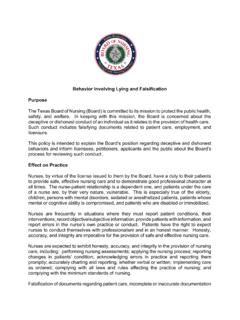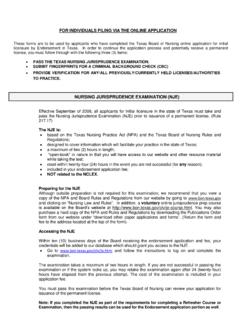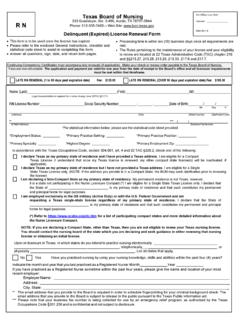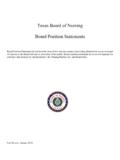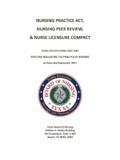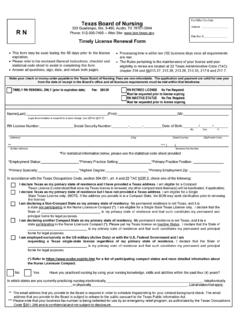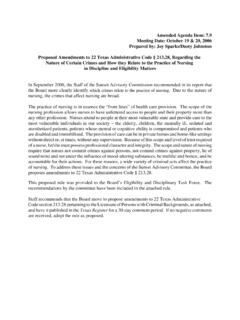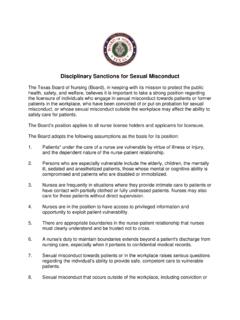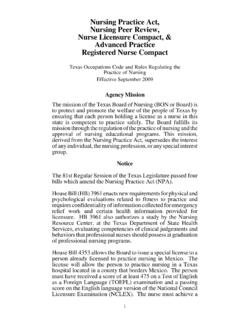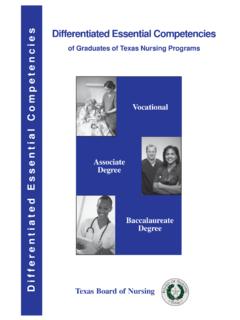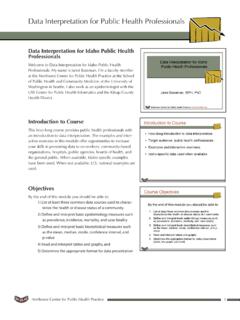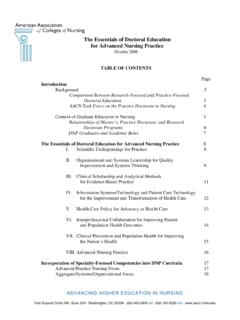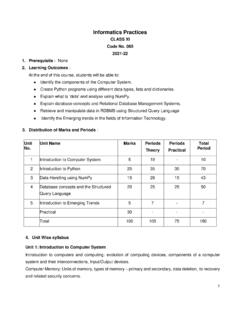Transcription of Differentiated Essential Competencies of Graduates of ...
1 2021 Texas Board of Nursing 1/21/2021 Evidenced by Knowledge, Clinical Judgments, and Behaviors Differentiated Essential Competencies of Graduates of Texas Nursing Programs i Table of Contents introduction .. 1 Executive Summary .. 3 Vocational Nursing Education Education and Scope .. 4 Core Competencies of Graduates of Vocational Nursing Education .. 5 Diploma and Associate Degree Nursing Education Education and Scope .. 7 Core Competencies of Graduates of Diploma and Associate Degree Nursing 9 Baccalaureate Degree Nursing Education Education and Scope .. 11 Core Competencies of Graduates of Baccalaureate Degree Nursing Education .. 12 Texas Board of Nursing Differentiated Essential Competencies .. 14 - 73 (DECs) Core Competencies .. 14 I. Member of the Profession .. 18 II. Provider of Patient-Centered Care .. 27 III. Patient Safety Advocate .. 50 IV. Member of the health Care Team.
2 59 Implementing the DECs in Education and Practice .. 74 Glossary .. 75 References .. 77 Members of the DECs Work Group and Board Staff .. 84 1 | Texas Board of Nursing introduction Differentiated Essential Competencies of Graduates Of Texas Nursing Programs Evidenced by Knowledge, Clinical Judgments, and Behaviors 2021 Background of the DECs The original Board charge to develop Differentiated Competencies for nursing education programs was issued by the then Board of Nurse Examiners (BNE) following a legislative mandate in 1988. Three different versions have been developed by Board staff with input from Board-appointed stakeholders (nursing educators, professional organizations, practicing nurses, state agencies, and consumers): 1993 First Edition - Nursing Education Advisory Committee (NEAC) 2002 Second Edition Differentiated Entry Level Competencies of Graduates of Texas Nursing Programs (DELCs) 2010 Third Edition Differentiated Essential Competencies of Graduates of Texas Nursing Programs (DECs) A team of Board Staff that included both Nursing Consultants for Education and Nursing Consultants for Practice collaborated in the 2021 Fourth Edition to ensure a focus on both perspectives.
3 Following the previous processes, a comprehensive review of current literature, practice standards, accreditation requirements, regulations, and research findings ensued. The guiding principles that were established by the first DECs committee have continued to be sound and useful in making revisions: 1. The DECs are client-focused, rather than institution-focused. 2. The DECs would not be developed as a list of tasks or skills. 3. Competencies will provide Essential role responsibilities, knowledge, and clinical behaviors and judgments in broad terms 4. Programs will be able to develop and create curricula for their communities, level of education, and program outcomes by focusing on the DECs. 5. The DECs are not all-inclusive of all nursing Competencies but list Competencies necessary for the nursing graduate to seek licensure and enter nursing practice.
4 Nursing Education and Scope of Practice The legal scope of practice for licensed nurses in Texas is dependent upon the educational preparation in vocational, professional, and graduate nursing education programs. Licensed vocational nurses (LVNs) and registered nurses (RNs) provide a wide range of nursing care through the roles of Member of the Profession, Provider of Patient-Centered Care, Patient Safety Advocate, and Member of the health Care Team. The Differentiated Essential Competencies (DECs) of Graduates of Texas Nursing Programs include 25 basic Competencies within the four nursing roles and describe the required outcomes for VN and RN nursing education with progressive differentiation of competency level for each 2 | Texas Board of Nursing educational level [Vocational Nursing Education (VN), Associate Degree Nursing Education (ADN), and Baccalaureate Degree Nursing Education (BSN)].
5 Further delineation of the Competencies is expanded through sub- Competencies with accompanying required subject content (Knowledge) and expected Clinical Judgments and Behaviors. Texas-approved nursing education programs are required to operationalize the DECs in the curriculum to assure that Graduates have been educated to carry out the Competencies . The Competencies for each educational level build upon the Competencies from the previous level. Comments about the Competencies The Competencies provide a set of outcomes expected of nursing education programs to ensure that newly licensed nurses enter practice with a knowledge base and a set of skills, including decision-making abilities, for safe practice. As the practicing nurse gains experience and perfects nursing skills and clinical judgment, their Competencies continue to grow as they move from novice to expert.
6 Any redundancies across the initial Competencies are intentional to allow the Competencies under each role to stand alone as performance characteristics. Some Competencies are identical for each educational level since the same expectations apply to all licensed nurses, such as the standards for safety. Differences in Competencies among educational levels reflect their respective assignments, level of autonomy in planning and practice decisions, required supervision, administrative roles, leadership responsibilities, and capacity for evaluation of care and caregivers. The DECs are useful as a basis for curriculum in nursing programs, orientation and internship programs for practicing nurses in health care settings, and the creation of evaluation tools for nursing education and practice. The DECs are consistent with Board Position Statements, Rules and Regulations, Education Guidelines, and other Board documents.
7 3 | Texas Board of Nursing Executive Summary Differentiated Essential Competencies Of Graduates of Texas Nursing Programs Evidenced by Knowledge, Clinical Judgments, and Behaviors 2021 Background The Differentiated Essential Competencies (DECs) is the fourth generation of the Texas Board of Nursing (BON or Board) Competencies with differentiation based upon the education outcomes of the three levels of prelicensure nursing education programs. The current revision was developed through a comprehensive review of current literature and research, nursing standards, state and national regulations, changes in the health care environment, and advances in nursing practice. Board Staff and a Board-appointed DECs Work Group provided guidance and expertise to the process. Purpose The DECs were designed to provide guidance to prelicensure nursing education programs to prepare Graduates to enter nursing practice as safe, competent nurses, as well as to provide a baseline for the health care setting of the nursing knowledge, skills, abilities, and judgment among Graduates from Texas nursing programs.
8 It is acknowledged that not all Competencies can be evaluated upon graduation from a nursing program, but the graduate will have received the educational preparation to demonstrate each competency. As the novice nurse gains practice experience, the entry-level Competencies from education will continue to grow as the nurse demonstrates an expanding expertise. Outline of the DECs Twenty-five core Competencies in the DECs are categorized under four main nursing roles: Member of the Profession Provider of Patient-Centered Care Patient Safety Advocate Member of the health Care Team Each core competency is further developed into specific knowledge areas and clinical judgments and behaviors based upon the knowledge areas. Redundancy is intentional so that the section under each role can stand alone. Competencies for each level of educational preparation are presented in a table format.
9 The Competencies are Differentiated and progressive by educational preparation. The scope of practice and competency level may be compared across the table. Implications For Nursing Education: Guideline for curriculum development and revision Benchmark for measuring program outcomes Statewide standard to ensure that Graduates are prepared to enter practice as safe, competent nurses For Employers of Nurses: Guide for development of employee orientation and internship programs Baseline for job descriptions and career ladders Description of entry-level Competencies for new nurses Information helpful for reviewing and revising policies and procedures for nursing care 4 | Texas Board of Nursing Texas Board of Nursing Vocational Nursing Education Education and Scope The curriculum for vocational nursing (VN) education is delivered as a certificate program of approximately one year in length offered by a college, university, or career school or college, or in a hospital or military setting.
10 Texas Board of Nursing (BON or Board) Rule 214 for Vocational Nursing Education requires didactic and clinical learning experiences designed to prepare Graduates to practice as safe, competent nurses who are able to demonstrate the Competencies outlined in the DECs. The BON approved curriculum incudes requirements for instruction in the five basic areas of nursing care: (1) children; (2) mothers and newborns; (3) elderly; (4) adults; and (5) individuals with mental health problems. The initial clinical instruction takes place in the skills and simulation laboratories, progressing to faculty supervised, hands-on clinical experiences with actual patients in health care settings. Clinical experiences in psychiatric nursing are optional, but the mental status of patients should be considered in all clinical settings. Required nursing and support courses provide instruction in nursing roles; biological, physical, social, behavioral, and nursing sciences, including body structure and function, microbiology, pharmacology, nutrition, signs of emotional health , human growth and development; vocational nursing scope of practice, and nursing skills.
